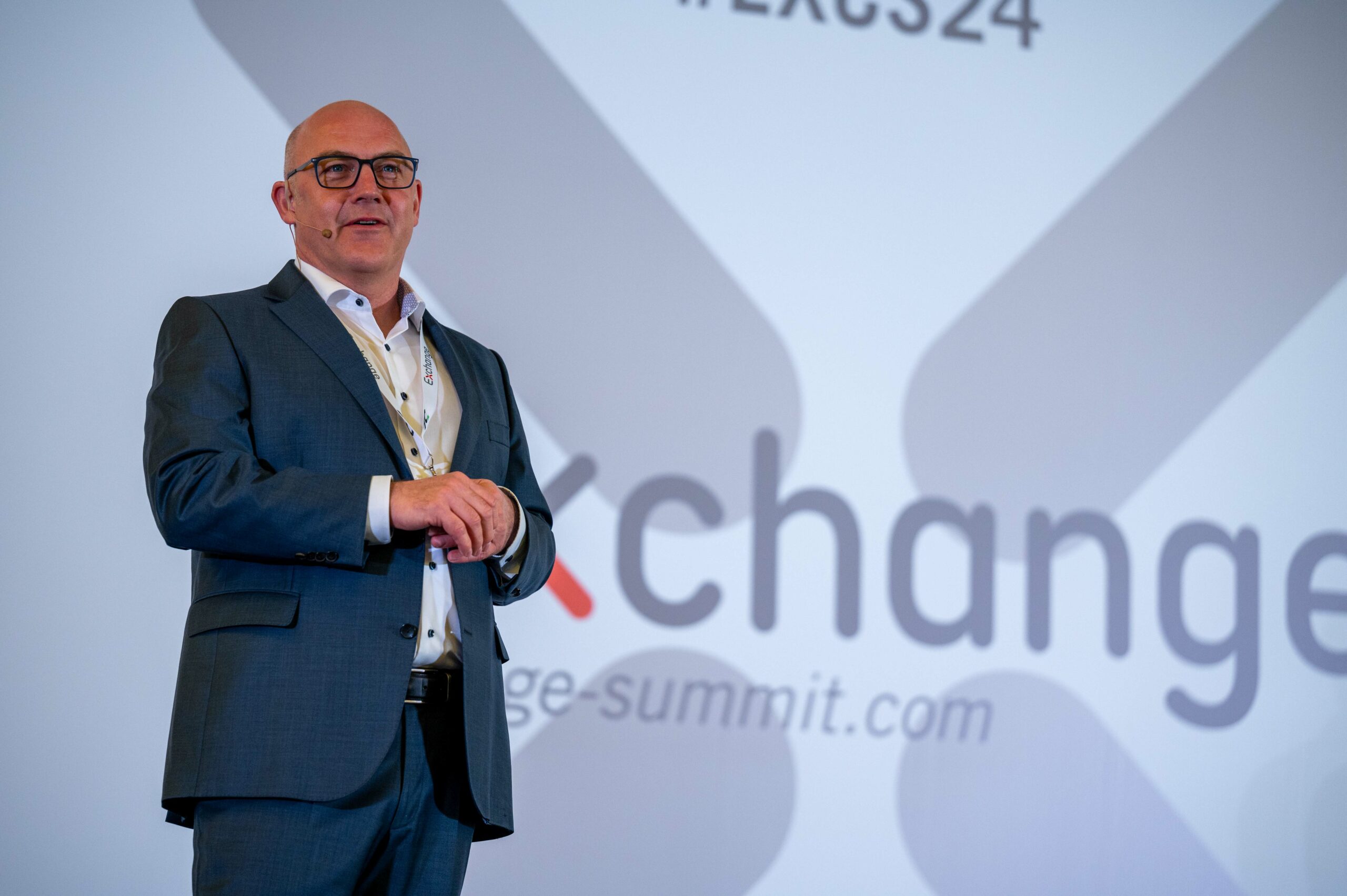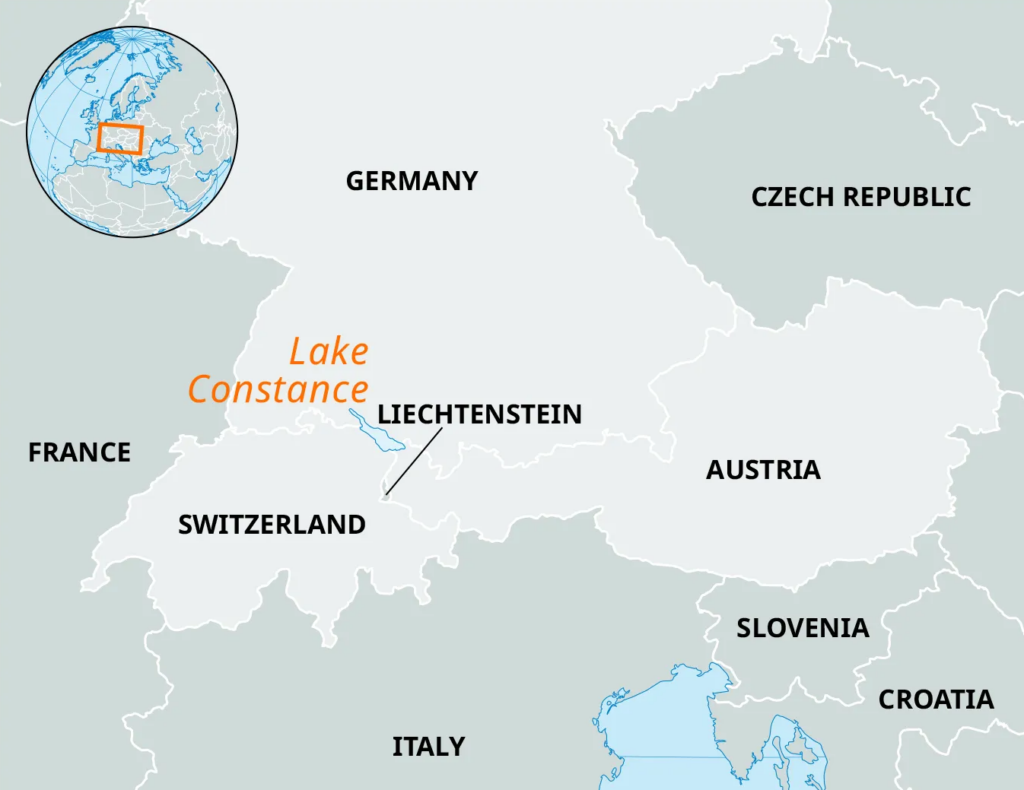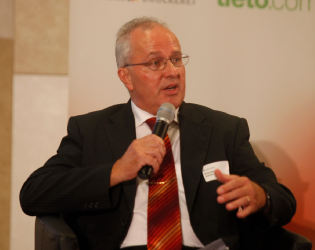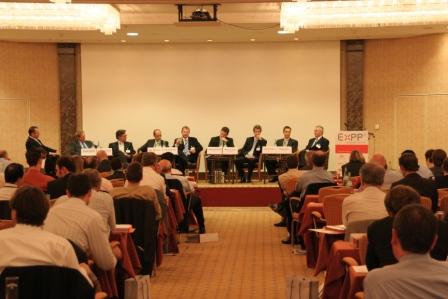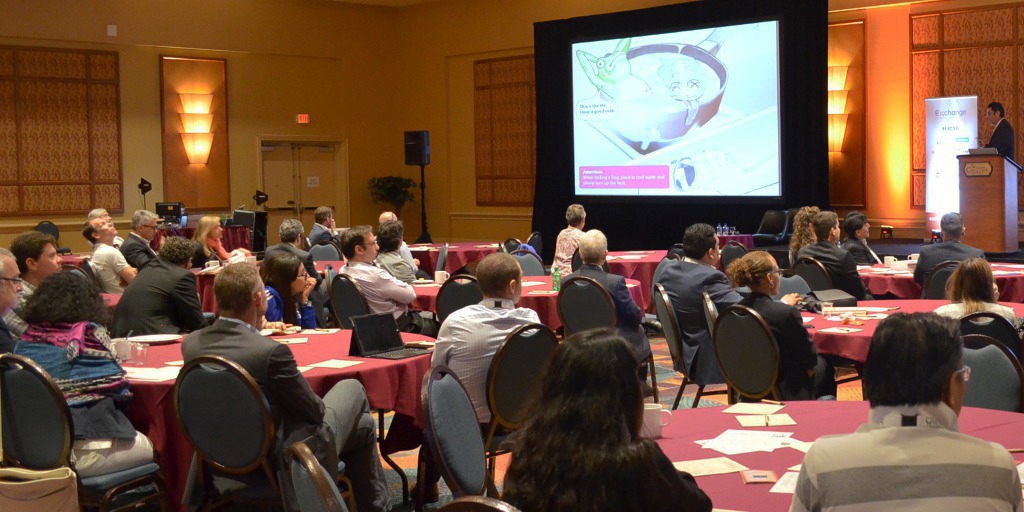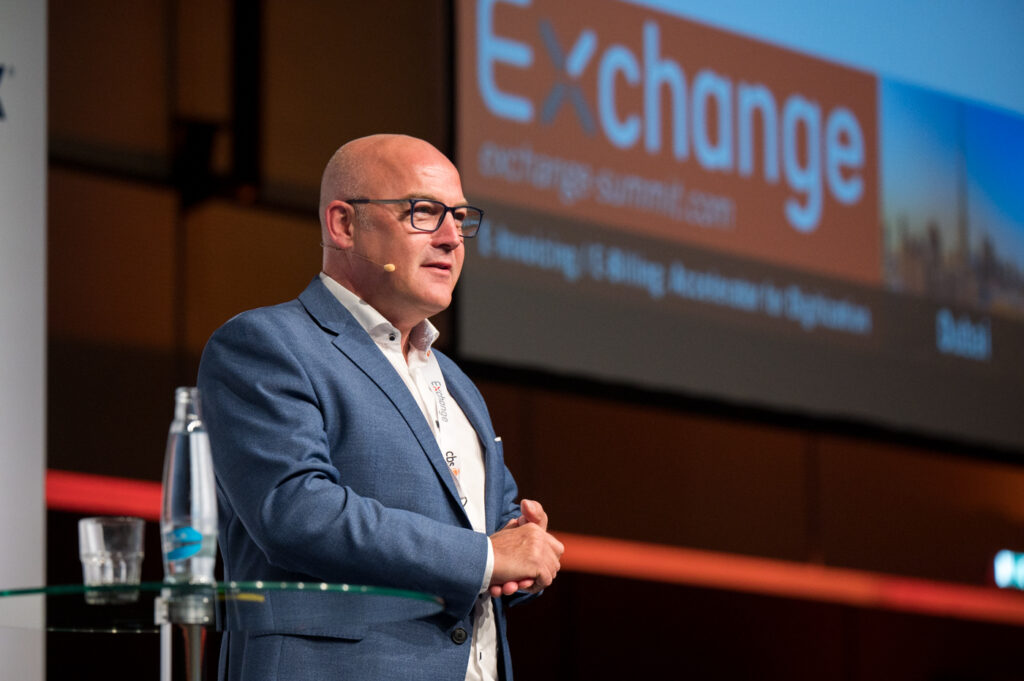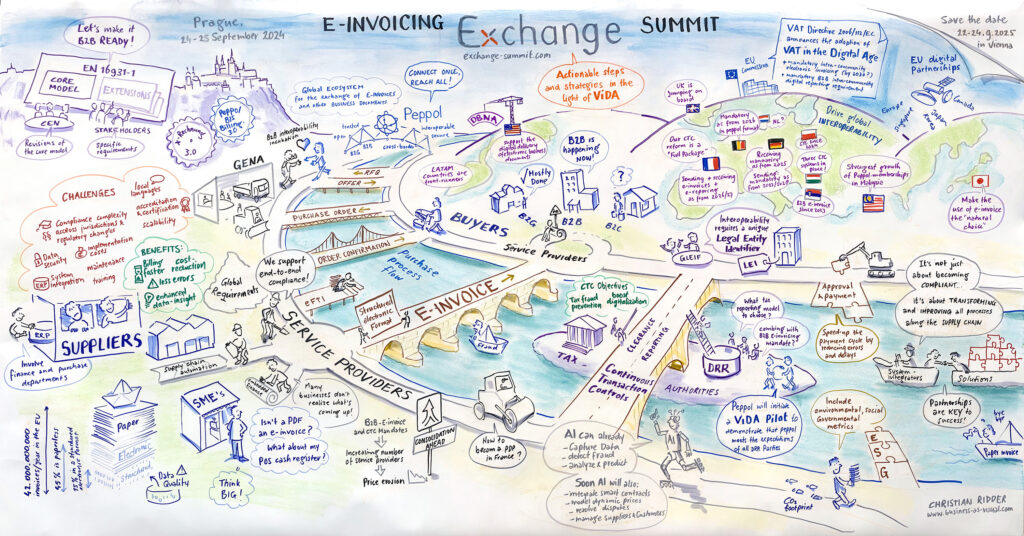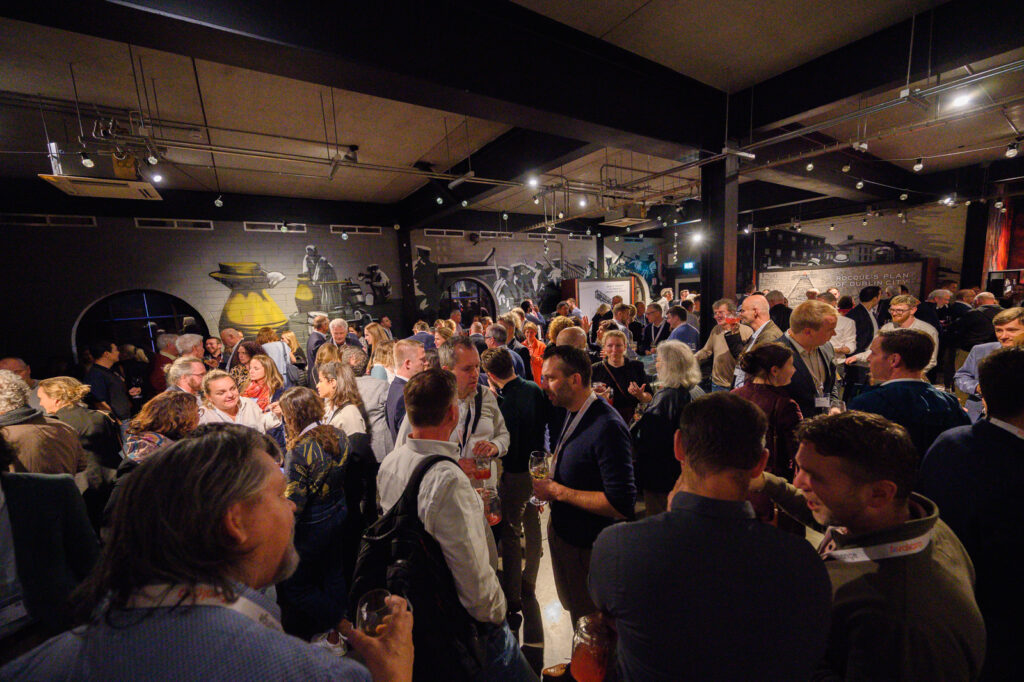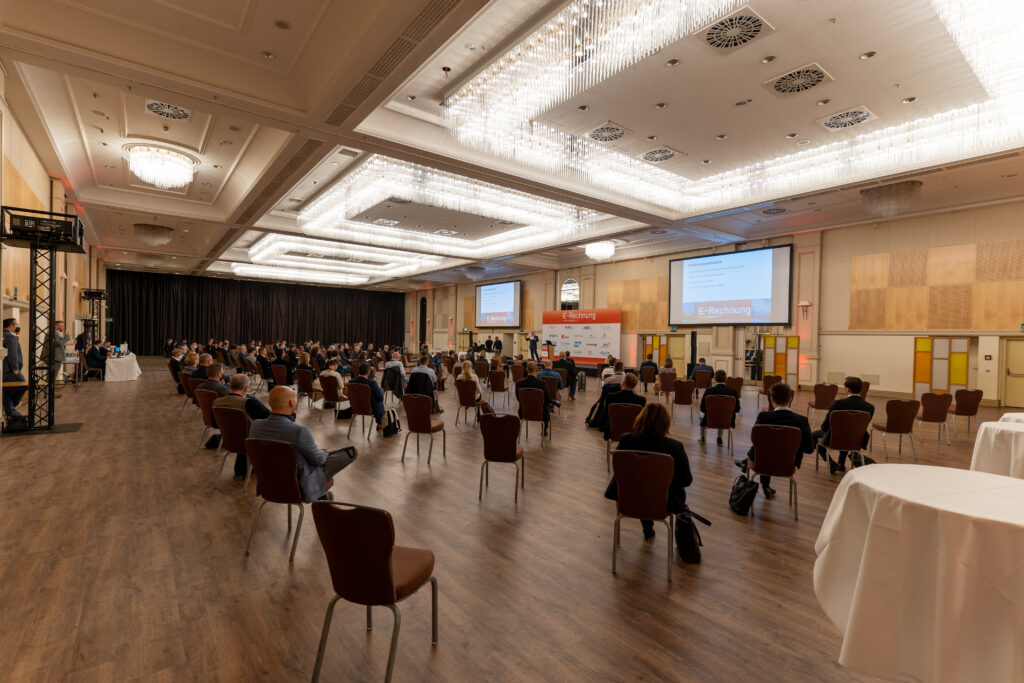People in e-invoicing
A conversation with Johannes von Mulert and the story of the E‑Invoicing Exchange Summit
- Publication Date: December 17, 2024
In this exclusive interview, Johannes von Mulert, the man behind the Exchange Summit, shares the story of how the conference evolved from its beginnings to become a world-renowned event.
Discover his views on e-invoicing and digital transformation, along with his insights into the industry’s growth and future trends.
Hello, Johannes, and thank you for joining us for this interview. Our goal today is to discuss e-invoicing, of course, but also to get to know you better. We often see articles covering technology, laws, and projects, but far fewer that highlight the people behind them! And who better to start with than you, Johannes von Mulert, CEO of Vereon AG and organizer of the renowned E-Invoicing Exchange Summit.
Hello, and thank you for having me!
You’ve just returned from Kuala Lumpur, where the latest edition of the 2024 Exchange Summit took place. How was the event?
That was really an amazing experience: the event brought together over 150 participants from 20 countries, creating an inspiring atmosphere of collaboration and innovation. It was officially opened by YB Datuk Wilson Ugak Kumbong, Deputy Minister of Digital in Malaysia! Personally, I found it incredibly rewarding to connect with experts from around the globe, exchange ideas, and gain fresh perspectives that will undoubtedly shape my approach to digital transformation in the future. A special note of gratitude goes to the Malaysia Digital Economy Corporation (MDEC) for their outstanding support.
Awesome ! OK, now let’s start with the basics about you: can you give us a brief introduction? Where are you from?
Well, I’m 52 years old … the best age! I was born in the south of Germany near Lake Constance. I’ve got two brothers, and I went to school in Konstanz. It’s a beautiful place, but it’s also quite foggy, like today! So, after finishing school, I decided to leave the area to pursue my studies. I first went to Ingolstadt, in Bavaria, and then to Mannheim, in Baden-Württemberg. It was a great university.
What kind of university was it? What did you study?
I studied business administration and earned a master’s degree. I focused on finance and had a huge interest in IT and marketing. Also, as it was possible in those days to explore various fields, I began focusing on tax while still at university.
Finance, IT, Marketing, and Tax… that sounds like a direct path to what you do today—it’s come full circle!
Yes, exactly. I also took optional courses on founding a business, which was a long-term dream of mine. However, back then, I was still searching for the “right idea.” So, after completing my exams, I left university for my first job as a trainee in the marketing department of a large industrial company, but I quickly realized that working in a company with thousands of employees wasn’t really for me.
So, what led you into the e-invoicing world?
After that first job, I began looking for new opportunities and, by chance, found a job listing in the newspaper. This was in the late ’90s, and that’s how things were done back then! The job was with a conference-organizing company, where I discovered this industry, working alongside many young and talented people. My first conferences there were on banking and finance topics, and with the rise of the dotcom economy, we simply put an “e-” in front of everything, which led to a lot of success—it was quite an exciting time!
« I remember once sending 20,000 letters just to promote one conference »
Johannes von Mulert
That explains how you gained expertise in the conference field! How long did you stay with that company?
Yes, it was an early imprinting! I stayed there for about four or five years. It was near Frankfurt, which is a great city to live in when you’re young. But then the dotcom bubble burst, and that was when my wife and I decided to start a family and move back to Lake Constance, where we still live.
Back to your roots! What did you do there?
There was a large pharmaceutical company nearby that was looking for an event manager, so I joined them! It wasn’t conferences but rather events like team-building and fun activities, which gave me a different perspective on what events can be. But soon after, I started exploring options to pursue my plans and establish my own company, and eventually, Vereon was founded at the end of 2003.
Looks like we missed the 20th anniversary! You’ll be celebrating the 25th soon enough… So, how were the early days?
It was challenging at first because no one knew me, and there were no social networks or online promotions. We had to print all materials—brochures, documents—buy envelopes, and send everything by postal mail, which was a huge expense because you needed to send thousands. And then there was gathering the addresses! I remember once sending 20,000 letters just to promote one conference. But, slowly, we found our niche.
What was this niche at the time?
Back in my conference-organizing job in Frankfurt, I met some speakers and got to know Bruno Koch. We collaborated on a conference about “electronic bill presentment and payment,” which was his vision from his time at a Swiss bank. We thought we made a strong team, so we began planning the first E-Invoicing Summit, which took place in September 2005 in Zurich.
So the Exchange Summit dates back to 2005, meaning it took less than two years from the founding of Vereon to the first E-Invoicing Summit. That was relatively quick!
Yes, and next year will be the 20th anniversary of these E-Invoicing Summits, so that will be something to celebrate.
Can you tell us about that first edition of the E-Invoicing Summit?
It was a huge success—we had around 160-170 participants. Bruno handled the content, I managed the marketing, and we sent out an international mailing to so, so many people! At the conference, we also used overhead projectors and transparencies, printed everything in advance, and gave each participant big bags filled with paper copies of all the slides. People enjoyed meeting like-minded professionals, and that was the beginning of our international community. I realized then it was worth continuing, as there was a real need and eagerness for such gatherings, regardless of economic conditions or market situations.
Is that when you decided to make it a recurring event?
Yes, we began organizing more conferences, and Vereon started growing. We hosted a European event each year, which was originally called EXPP Summit. We also began organizing smaller, one-day events in Austria, Germany, and Switzerland.
And is that where the E-Rechnungsgipfel comes in—an annual event in German only?
Exactly. What surprised me at the time, though, was that I thought e-invoicing and automation in general were such obvious choices—there are so many benefits! But here we are, 20 years later, and while we’ve made some progress, there’s still so much more to be done. That’s why it’s so important to keep discussing and advocating for it. Anyway, over time, I was doing more management and less hands-on work, and I started missing that.
What happened next?
The economic crisis hit at the end of the 2000s, which made things challenging—for us to organize events, and even more so for participants who couldn’t attend anymore. This brought me back to the forefront, allowing me to be more involved in the operations and the actual event organization, which I really enjoyed. I realized that even if I had to do it alone, this is what I’m passionate about, so I decided to keep going. Eventually, the participants returned, and we continued organizing our events.
What was the next milestone?
In 2014, Bruno Koch decided to step back and asked if I wanted to continue on my own. Of course, I did! My first decision was to make the event more global, as e-invoicing is indeed a global topic. The U.S. was the natural first choice, and we held our first event there in 2016. We expanded to Asia in 2018 and then to Dubai in 2022.
What inspired you to make it global?
The main reason is that I believe exchanging ideas and experiences is so important—not only between companies but also on an international level. From earlier events, I learned that many of us are doing the exact same things in our companies, each of us reinventing the wheel. And this isn’t just about e-invoicing; it applies to payments and every business process. If you want to advance, you first have to share what you’ve learned and learn from others. People were initially hesitant to share what worked well, fearing they’d help competitors, so it took some time. But now everyone realizes that sharing is beneficial. Together, we’re much faster and stronger. Yes, we are competitors, but sharing makes sense, too.
I couldn’t agree more. This is also what we’re trying to do at The The Invoicing Hub: instead of everyone searching for accurate e-invoicing information on their own, we take on that responsibility. We verify sources and provide all the news publicly, so we’re definitely aligned with you on that topic!
Exactly. And all the tax administrations were working on similar issues—some had very good ideas, others less so—and I wanted to give them a platform to discuss and learn how to be more successful. They play a crucial role because, as I mentioned, in most countries, e-invoicing only works well when governments make it mandatory.
« Governments should "give back" to companies as much as possible, by providing access to valuable real-time data or facilitating administrative tasks »
Johannes von Mulert
True, although there are also countries where e-invoicing has been widely adopted without any mandate, like in the Nordics. How would you explain that?
I think it’s a cultural aspect—there’s an open-minded, tech-friendly population. It may be due to the long distances, the harsh winters, and the prevalence of small and very small businesses, which creates a strong need for automation and efficient communication. For example, this is where companies like Nokia were founded and where the mobile phone was invented.
What led you to organize your first international event in the U.S.?
Actually, it was less about the U.S. itself and more about Latin America. They were early adopters of e-invoicing, advancing rapidly due to strict mandates. We chose Florida as the location because it was practical for gathering everyone. Initially, we had many government representatives for example from Mexico, and the discussions were fascinating because they brought a completely different perspective from what we had heard before in Europe.
Can you elaborate on that?
Their main issue was the VAT gap, with significant tax revenue losses. So they went for a fully regulatory approach and mandated e-invoicing, which is one reason it advanced so quickly there. Unfortunately, without that kind of pressure, e-invoicing doesn’t really take off as effectively anywhere in the world.
Thank you, Johannes, for tracing the roots of the E-Invoicing Exchange Summit for us. You mentioned “payments” earlier. You’re also involved in the Swiss Payment Forum, right? Could you tell us more about it?
Sure. We started the Swiss Payment Forum because Switzerland serves as a global financial hub, and, similar to the Exchange Summit, professionals in the Payment & Banking sectors are eager to meet peers and share insights. Each year, about 200 attendees come to participate in the conferences and network. Essentially, if you want to connect with someone from the Swiss payment industry, this is the place to be. It’s conducted in German, but we have live interpreters.
I believe the Swiss Payment Forum is mostly managed by your wife. How did you come to work together?
We actually started working together a few years after returning to Lake Constance. With our young children, it was challenging for us to keep up with two jobs, and her joining Vereon made it a lot easier. Today, Nicole indeed manages the Swiss Payment Forum, while I handle the E-Invoicing Exchange Summit.
Are there synergies between the e-invoicing and payment sectors?
They are quite related, and people are interested in developments in both areas, but they’re still distinct enough that synergies are limited. For now, we keep the two events separate.
« We’re in a consolidation phase that began a couple of years ago and now really seems to be accelerating »
Johannes von Mulert
Are you involved in organizing other events?
Yes, we’re also engaged in the International Business Communication Standards (IBCS), which is widely applied in accounting and financial reporting. We founded the IBCS Association, which now has over 12,000 members, Vereon organizes German-language events on the topic. IBCS is currently in the process of becoming an ISO standard status, as our application was accepted this summer, and a technical committee is now working on the specifications. This is more focused on finance rather than IT or processes, so it aligns well with my area of personal interest.
Tell us more about the operational side of organizing events. What is your biggest event, and how do you plan for it?
The E-Invoicing Exchange Summit is our largest event. Just a few days ago, we were in Kuala Lumpur, and we’re now actively working on the Dubai event in February. We also work on securing sponsors and booking venues at least a year in advance. For instance, the 2025 European edition will be held in Vienna.
What do you think about the current state of the e-invoicing market?
We’re in a consolidation phase that began a couple of years ago and now really seems to be accelerating. We’re seeing major mergers in the market, like Thomson Reuters & Pagero and Vertex & ecosio, with likely more to come. So, while the market is consolidating, there are also smaller companies emerging, bringing new ideas and perspectives, which is interesting as they spot opportunities. It’s no longer just about processing EDI data but also about delivering services. The next wave may involve payments, as we’re seeing major players like MasterCard and Visa expressing interest in the invoicing space.
What do you foresee for the coming years?
ViDA will be a major development, keeping everyone busy for years to come. It will shift the focus from pure e-invoicing to e-reporting, possibly bringing in new topics over time. If invoicing and reporting become aligned, we may see additional reporting needs arise—not just for tax, but potentially for areas like ESG reporting. We’re already discussing how ESG could be integrated into the same platforms and channels. The payment aspect will probably become part of this evolution too.
And what’s on the horizon for the E-Invoicing Exchange Summit?
I believe it’s important to avoid turning it into a massive event with 1,000 people, as that would change the dynamic. With 250-300 attendees, it stays intimate, comfortable, and can be hosted in a hotel, which makes networking easier without needing a big exhibition hall. This keeps it special and engaging for attendees. Ideally, I’d love to organize more events, but from an operational perspective, it’s challenging to see how we could manage even more than we do now.
You said “ideally”…so in an ideal world, what other events would you consider organizing?
I could imagine having one in Africa, probably in a central place like Nairobi. That would be quite a challenge, but really worth doing it as we can see e-invoicing getting more and more traction in Africa too. Also going to South America, for example to Brazil, and to see where they currently stand. It would be interesting as they are like 10 years ahead of the rest of the world. They are now exporting their success models, but they are also thinking further, they already have the economy data in real time so we have much to learn. Australia would be great too, even though it’s a bit the end of the world for everyone to come there! And of course, looking at more local events – like the German E-Rechnungsgipfel – would be an option as well, for example in the UK, which is looking at possibly mandating e-invoicing, or in France as another huge market. But as I said, you can’t have it all! Alternatively, we could also organize online events, like we did during Covid.
How did Covid impact the E-Invoicing Exchange Summit? Did you have to cancel many events?
I think we had to cancel only two: one E-Invoicing Exchange Summit and one German E-Rechnungsgipfel. For the others, we had to postpone a few of them, but most times we got lucky as the events happened between the waves. Still, we had to limit the number of attendees, everyone had to keep distances, there were masks, etc. But people were so happy to come and be again with other people, share experiences, discuss, network…
That sounds challenging, with a lot of last-minute adjustments.
Well, Covid certainly was different. Usually, we have a fixed date when the event is happening, and everything happens at the same time, so we have to coordinate everything. We cannot shift dates, and everything has to come in place at the proper time. During Covid, it was even more complex, so you have to be very stress-resistant.
To wrap up our discussion on e-invoicing, countries obviously have different strategies when it comes to implementing it. Some impose nationwide mandates, while others take a more relaxed approach. What would be your personal recommendation?
I mentioned the Mexican market earlier: everyone said, “Oh, that’s very strict.” In the end, it turned out to be successful because they have a high adoption rate. A few years ago, in Italy, people were questioning why they were implementing e-invoicing. There were some hiccups, but now it’s working, and they’ve managed to reduce their VAT gap significantly. So, generally, I think the quick approach works best, rather than waiting too long and postponing over and over again. Similarly, ViDA is a step in the right direction; it’s an opportunity, not a threat. I would also recommend that governments “give back” to companies as much as possible, by providing access to valuable real-time data or facilitating administrative tasks, like pre-filled tax declarations.
Let’s finish this interview by learning more about you. What does Johannes do when he’s not working? Who are you on Saturdays and Sundays?
Generally, life is good in Switzerland, around Lake Constance. I’m the president of a local sports club and act as coach for the adult “Fit & Fun” group. Of course, I also participate in the sports myself. Additionally, I organize events for the kids in the club—one doesn’t change! We are a familiy of five, so you can imagine where the rest of my energy goes. From time to time, since we live near the mountains, we go hiking in the summer and skiing in the winter.
You travel the world organizing events. Do you take the opportunity to stay a little longer with your family in those countries after an event?
Unfortunately, no, there’s always so much to prepare for the next events that we never managed to extend our stays so far. Maybe next year!
Thank you Johannes for this interview!
Learn more about the Exchange Summit
The global editions of the E-Invoicing Exchange Summit provide in-depth information about recent developments and future trends in E-Invoicing, VAT-Reporting, and beyond. Participants benefit from cutting edge keynote speeches, panels, round tables, and great networking opportunities.
Discover our Sponsors
Powered by the world’s most sophisticated invoice-centric AI – trained on over 2 billion invoices – Basware's Intelligent Automation drives ROI by transforming finance operations. We serve 6,500+ customers globally and are trusted by industry leaders including DHL, Heineken and Sony. Fueled by 40 years of specialized expertise with $10+ trillion in total spend handled, we are pioneering the next era of finance.
With Basware, now it all just happens.
OpenPeppol conference 2025 – Brussels, June 17-18
E-Rechnungs-Gipfel Berlin – June 23-25, 2025
B2G e-Invoicing now mandatory in Rheinland-Pfalz
[UPDATED] New OIOUBL 3.0 invoice standard released in Denmark
Peppol registration considered as automatic agreement for international e-invoicing in Belgium
The Invoicing Hub
experts can help you
Strategy, Guidance, Training, …

